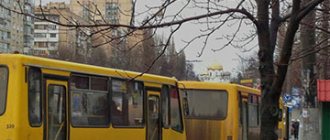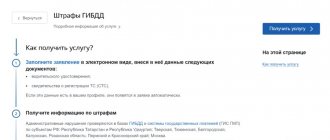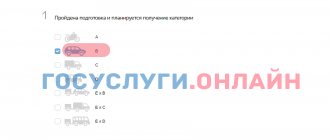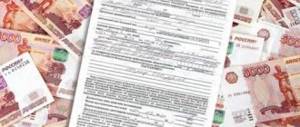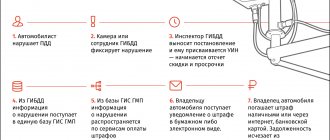The order to pay fines for violating the Traffic Rules, like any official document, has a fixed deadline for its execution.
The repayment period for traffic fines from May 9, 2013 is 60 days, which are calculated from the moment the resolution comes into force. And it comes into force immediately after the expiration of 10 days given for the possibility of appealing the fine to the State Traffic Inspectorate or court.
Today we will talk in detail about the nuances of calculating the repayment terms of administrative fines for traffic violations, point out the possibility of obtaining a deferment or installment plan for fines, and also talk about liability for their late payment.
What is the deadline for paying traffic fines?
To find out how long the law allocates for paying off fines for administrative offenses (including traffic violations), just refer to Article 32.2 of the Code of Administrative Offenses of the Russian Federation. It states that fines are paid in full within 60 days from the date of entry into force of the decision imposing an administrative fine.
When exactly does the resolution come into force? Let us turn for clarification to the full text of Article 31.1 of the Code of Administrative Offenses of the Russian Federation:
A decision in a case of an administrative offense comes into force:
1) after the expiration of the period established for appealing a decision in a case of an administrative offense, if the said decision has not been appealed or protested;
2) after the expiration of the period established for appealing a decision on a complaint, protest, if the said decision has not been appealed or protested, except in cases where the decision cancels the decision;
3) immediately after making a non-appealable decision on a complaint or protest, except in cases where the decision cancels the decision.
The driver is given exactly 10 days to appeal from the moment he receives the decision (or a copy thereof). If the decision was issued by a traffic police inspector, then the countdown of 10 days to appeal it begins immediately, that is, the next day will be the first.
If the decision came by mail (in the case where the violation was recorded by automatic traffic cameras), then the period is counted from the day it was delivered by the postman or from the day the driver received the mail notification.
Important! If you evade receiving the document, the resolution will inevitably return to the addressee (the traffic police authority) and will still come into force 10 days after the return.
As a result, we find that the time for paying the fine includes:
10 days (appeal) + 60 days (payment of fine) = 70 days (from the date of receipt of the decision)
“We must follow the rules.” It was proposed to cancel the discount on fines
The author of the law is State Duma deputy Vyacheslav Lysakov, who reacted extremely negatively to the initiative to abolish fines voiced in Tatarstan.
“He just multiplied 50% by two. Indeed, why collect 50% if you can collect 100%? True, Minnikhanov did not think about the loss of the budget in the event of appealing fines to the traffic police and the courts, Lysakov wrote on his Facebook. — About the fact that bailiffs will be forced to spend time, effort and money on collecting fines, since many of those who are now paying fines ahead of schedule will simply stop paying them. And it’s scary to think what will happen to the Federal Bailiff Service if all car owners stop paying their fines voluntarily as a sign of protest. The FSSP will simply collapse. And in any case, the collection of fines will fall.”
The deputy called the proposals made a political provocation.
“I’m already expecting the idea of repealing another law - on the possible total error of measurements, which is popularly called “abolition of zero ppm,” Lysakov was indignant.
Articles December 19, 2021 What will happen in 2019: expensive cars and disputes with the government
News December 19, 2021 The traffic police named the main causes of accidents involving novice drivers
In turn, Lawyer Sergei Smirnov, in a conversation with Autonews.ru, said that the discount system was launched in order to somehow increase the collection of fines. “This was partially successful, but for those who fundamentally do not pay traffic fines, it doesn’t matter whether there is a discount or not. Therefore, in my opinion, this system should be abolished and simply make the bailiffs work better.”
The rule on a 50 percent discount when paying an administrative fine from the State Traffic Safety Inspectorate appeared in Russian legislation in January 2021. This rule applies if the fine is paid within 20 days from the date of the decision to impose administrative liability. The norm does not apply to fines issued for driving a vehicle by a driver who is intoxicated, transferring control of a vehicle to a person who is intoxicated, and for refusing a medical examination. According to the Administrative Code, motorists who commit such a violation will have to pay 30 thousand rubles.
With the entry into force of the norm, the State Traffic Inspectorate stated that the innovation will encourage citizens not to delay the payment of fines imposed on them and, thus, will increase the number of fines paid by offenders voluntarily. Which, in turn, will allow the state to concentrate its efforts on the fight against truly malicious non-payers of fines.
Transferring the fine to bailiffs
However, 70 days is not quite the correct period during which a driver can pay a fine without serious consequences. The fact is that after 70 days, the fine case is transferred to bailiffs for execution, and the law allots another 10 days for this procedure. That is, forced collection of a fine occurs only 80 days after receipt of the decision on the violation:
10 days (appeal) + 60 days (time to pay) + 10 days (the traffic police fine is handed over to the bailiffs) = 80 days
When the bailiffs find the debtors, they give them another 5 days to pay the fine voluntarily. In the case where the debtor was actively hiding from government officials and evading payment of the debt, the statute of limitations on his case (which for administrative fines is 2 years) is extended for the entire period while the offender was “on the run.” This will happen immediately after the bailiffs find the debtor.
It turns out that if during the statute of limitations for a traffic fine you actively avoid meeting with the bailiffs, then you should not count on the fact that after 2 years you will no longer be held accountable. But if for two years after the imposition of a traffic fine (and another 10 days that were given to appeal it) no one looked for the driver, then after their expiration no one will be able to request a fine.
Important! The statute of limitations should not be confused with the statute of limitations for holding people accountable for violating traffic rules. If after committing an offense within two or three (if the case is being considered by the court) months you have not been served with a decision, then responsibility for the offense does not arise.
On what grounds can you file a complaint?
Violation of traffic rules is a type of administrative offense and the procedure for challenging it or requesting a reduction in the amount of penalties is almost the same as for a regular administrative fine. The only difference is that challenging the amount of a regular administrative fine presupposes that the defendant agrees with the offense itself, but in the case of a traffic police fine, he rather disagrees.
You can apply to reduce the amount of the fine for several reasons:
- errors in the execution of the resolution;
- errors in classifying traffic violations due to malfunctions of video cameras (incorrect indication of the car model, its maximum speed limit according to characteristics, driver’s identity, etc.);
- errors in determining the degree of offense, leading to disproportionate punishment (inaccurate indication of the speed of the car);
- violation of the deadline for delivery of the decision by mail.
Especially many appeals to the traffic police or the court are due to the fact that the notification of the issued fine arrives late. According to the law, the car owner has the right to pay the traffic police fine with a 50% discount if he makes the payment within 20 days from the date the resolution is issued. If the letter is delayed, the penalty box loses the right to a discount. In this case, you have to apply to the court to extend the period of preferential payment.
In addition, a discount on the fine can be applied for in the presence of mitigating circumstances (Article 4.2 of the Administrative Code) - serious family circumstances, a state of passion at the time of the offense, pregnancy or children under 18 years of age, the commission of an offense by a minor.
Another reason is the missed deadline for submitting a petition to the traffic police to reduce the fine. The car owner has 10 days from the date of issue of the decision to appeal the amount of penalties. If information about the resolution does not appear on the website of the State Traffic Inspectorate, and the letter arrives late, this is a reason to file a petition, but not to the traffic police, but directly to the court (if there is evidence of good reason).
Important! A petition to reduce the amount of a fine for violating traffic rules will be accepted by the court for consideration only if the Code of Administrative Offenses provides for a price range for this type of fine depending on the severity of the violation. No discounts are available if you are fined for drunk driving, refusal of medical examination, accident with physical or property damage, or repeated speeding, running a red light, driving on the wrong side, etc.
Fines that have a price range are presented in Article 32.2 of the Code of Administrative Offenses (Part 1.3): driving a car without registration with the traffic police, license plates, car documents or driver's license, presence of tinting or damage, not fastening seat belts, speeding, driving at a red traffic light, incorrect parking/parking, driving through an intersection in violation, driving in oncoming traffic, etc.
Deferment and installment of fine payments
Sometimes the fine for violating the Traffic Rules is quite large, so the driver does not have the financial ability to pay it within the period allocated by law (70 days). In this case, he has the right to go to court, present evidence of poor financial situation (for example, a certificate of salary or lack of work) and ask for an installment plan or deferred payment. This possibility is reflected in Article 31.5 of the Code of Administrative Offenses of the Russian Federation.
What is the difference between installment plan and deferment?
- The deferment provides for a postponement of the payment deadline by 1 month, that is, the driver will have more time to pay off the traffic police fine;
- Installment plan – payment of the fine in installments over 3 months (the driver receives a monthly debt repayment schedule).
Responsibility for late payment of fines
What happens when the 70 days assigned to pay the fine expire? As we have already said, the case will be transferred to bailiffs, who have the right to apply the following types of punishment to the driver:
- a twofold increase in the amount of the fine (minimum by 1,000 rubles);
- assignment of community service for up to 50 hours;
- administrative arrest for up to 15 days.
The listed penalties are indicated in Part 1 of Art. 20.25 of the Code of Administrative Offenses of the Russian Federation and only a judge has the right to appoint them. In the vast majority of cases, a doubling of the fine is used. If community service is chosen as a punishment, it will not exceed 12 hours a week, which will force the driver to engage in community service for up to 2 months.
Important! Punishment in the form of arrest is applied only to the worst defaulters, who have a huge number of unpaid fines.
Bailiffs have the right to collect the assigned fine by seizing bank accounts or personal property of the defaulter. If the amount of debt exceeds 10 thousand rubles, then the debtor will be prohibited from traveling outside of Russia. By decision of the court, a special punishment may be applied to such fines - restriction of the validity of the driver's license.
The restriction is lifted only after all traffic police fines have been paid, and if the driver is caught driving a car with a limited license, then he faces real deprivation of his license for up to 1 year or 50 hours of community service.
Official response from the traffic police on the cancellation of the 50% discount when paying a fine within 20 days
This is not the time to relax! Right now, the New Administrative Code is being written in high offices.
Recently, amendments to the Code of Administrative Offenses have been made quickly - the roads should be repaired like that. Get your Panama hat ready - they’ll put a lot of stuff in there for us: the size of the fines will be changed, the statute of limitations will be revised, and so on and so forth.
I don’t like big surprises, so I went online to see what was already known about innovations. We must somehow comprehend and accept the inevitable.
One of the first lines that caught my eye was: the 50% discount on paying a fine within 20 days will be cancelled. This is news, just like a cold shower.
Let me remind you what I’m talking about for those who don’t understand:
Article 32.2 of the Code of Administrative Offenses, paragraph 1.3 states (not verbatim) that you can pay only half the amount of the fine if you manage to make the payment within 20 days from the date of the decision.
And before, fines did not pass unnoticed, but my soul was reassured by the fact that at least this was not the full amount, but now, that means, I will have to pay double? No, this is too much.
Maybe another fake? I look at the source: autotonkosti website. It’s a familiar resource, I often find information on it, and so far there’s been no reason to doubt it. So, will the discount be cancelled?
But I really want to believe in the best, so I dig further. What do they write on the traffic police website? I'll go read it. Although the site has probably already been crashed - after all, everyone, like me, wants to see with their own eyes that these dragons really took aim at the sacred.
I went to the website of the state traffic police and almost immediately came across an appeal from the head of the traffic police, Mikhail Chernikov. This issue of canceling the discount has been going on for so long that the auto community doesn’t know who to believe. Therefore, the traffic police gives an official comment in order to avoid misunderstandings.
This is what Lieutenant General Chernikov said about the 50% discount: “There is no need to abolish this norm,” and explained that such a discount on fines is needed. It is, as the head of the traffic police put it, “comfortable” for motorists.
This means there is nothing to worry about - the highest official of the department gave an answer that can be interpreted unambiguously: the discount remains.
Then where do fakes get their legs? Why is information being spread, to put it mildly, incorrect? There are several options:
- The author of that article did not understand / did not understand / did not want to offend anyone.
- The author decided to attract attention and hype.
- The author snatched an unapproved version of the amendment from the discussion and passed it off as the final one, I hope without malicious intent.
Indeed, in one of the draft versions there was a version with the abolition of the discount, but legislators changed it during hearings and discussions. And now, thanks to Chernikov’s explanation, we know that there will be no cancellation.
Well, at least this is cleared up. We will learn about the remaining amendments that await us in the new Code of Administrative Offenses immediately after the New Year's toasts as we go along.
And fight against fake guns, of course.
Paying off a traffic police fine with a 50% discount
Since the beginning of 2021, a law has been in force in Russia to reduce fines for traffic offenses if they are paid within the first 20 days after the decision is issued. The discount in this case will be exactly 50% of the original fine amount (Part 1.3 of Article 32.2 of the Code of Administrative Offenses of the Russian Federation). If the execution of the decision on an administrative fine is delayed or spread out by the judge, then the 50% discount will not apply.
The discount on payment of a fine within 20 days after the driver receives the order is valid for all types of violations of the Traffic Rules, with the exception of those that are most dangerous to society, committed repeatedly or while intoxicated.
Provisions of the Code of Administrative Offenses of the Russian Federation and judicial practice
In Part 1.3 of Art. 32.2 of the Code of Administrative Offenses of the Russian Federation establishes the right to reduce the fine for most articles of Chapter 12 (violation of traffic rules). The sanction is automatically reduced by exactly half if payment is made within 20 days from the date of the decision on administrative liability.
The rule was introduced in 2021. In mid-2021, news appeared that it was supposedly planned to cancel the 50 percent discount, but from what month was not specified. This provision has not been revoked at this time. The procedure for its application was clarified only by Resolution of the Constitutional Court of the Russian Federation No. 28-P dated June 23, 2020, but it did not directly concern the size of the discount. The Constitutional Court established that for citizens who paid a fine before the resolution entered into force, the period during which they are considered subject to collection is equal to one year.
There is no fine for not having a DVR in 2021 – official information from the traffic police
